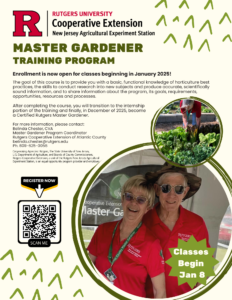 The Rutgers Master Gardener Program offers an intensive horticulture training to people interested in improving their gardening skills and giving back by helping to teach others. RMG ‘volunteers’ attend a series of classes in basic to intermediate horticulture, soils, fertility, pest and plant diagnosis, and management skills. In turn, they help their local County Rutgers Cooperative Extension office extend their outreach to the community by answering gardening questions on call-in/walk-in helplines or at community events; teach classes; and develop and implement demonstration gardens.
The Rutgers Master Gardener Program offers an intensive horticulture training to people interested in improving their gardening skills and giving back by helping to teach others. RMG ‘volunteers’ attend a series of classes in basic to intermediate horticulture, soils, fertility, pest and plant diagnosis, and management skills. In turn, they help their local County Rutgers Cooperative Extension office extend their outreach to the community by answering gardening questions on call-in/walk-in helplines or at community events; teach classes; and develop and implement demonstration gardens.
The 2025 class is open now and actively recruiting to begin classes in a couple of weeks. There is still room available if you or you know someone (garden center/farm market employees and/or customers, nursery/landscape business employees) who might be interested. Feel free to post this in your stores or pass it on to anyone you think might like to give it a try. More information is available via the QR code or go to https://go.rutgers.edu/RMG2025.

https://go.rutgers.edu/RMG2025
